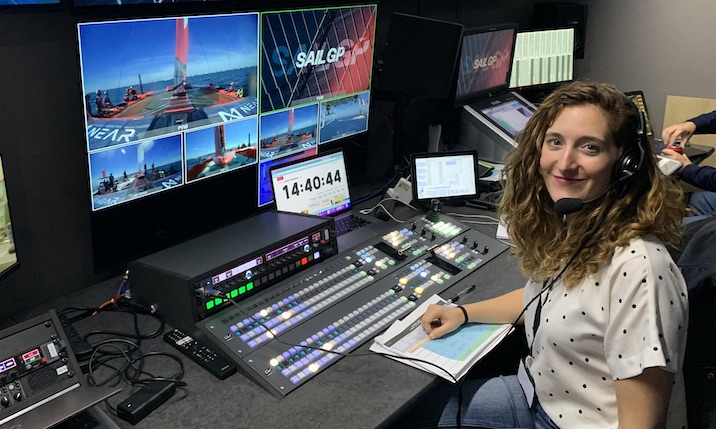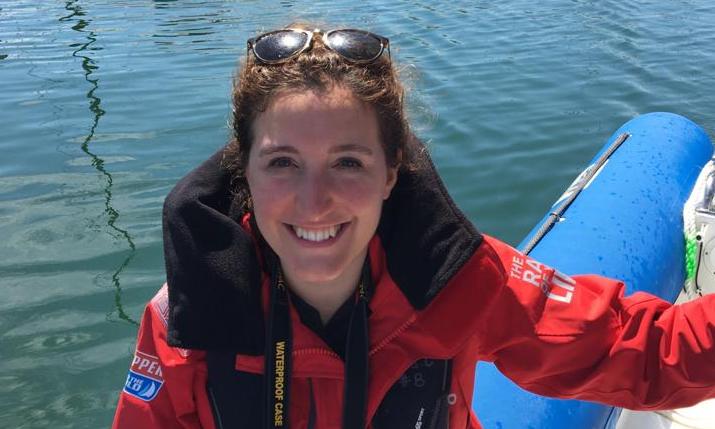The adrenaline of live with Maria Aloy Figueras from Aurora Media Worldwide

Figueras: ‘I never thought it wasn’t possible to have a career in broadcasting or sports broadcasting’
A significant moment in the career of editor, producer and live director Maria Aloy Figueras took place while she was at college in Barcelona. Having always thought she would pursue a career as a chemical engineer, she opted to write about the impact of music in TV for her final college essay. It proved to be pivotal.
“I discovered I liked how you can make people feel different emotions and create a different impact based on pictures and music,” she says. That led to her studying Audiovisual Communication in Barcelona, during the fourth year of which she undertook work experience at a TV studio in the news and sports department.
“I helped with some filming, video editing, studio floor managing, assisting in the gallery, and other tasks to support the team. And this is when I knew that my place was in TV. I had the opportunity to be part of such a lovely team who loved their jobs and made me love it too. For six months, they made me feel like I was an employee and not just an intern. I was so happy and seeing some of my work in TV was super rewarding.”
Gaining experience
After university, Figueras was granted an internship abroad, and opted for London. After sending some 200 emails to TV and other production companies, she secured a six-month placement at a music magazine company where she filmed and edited video. However, finding her next position proved tricky and so in need of money she worked in a restaurant for 18 months. It proved to be a valuable experience, helping Figueras improve her English language skills.
“When I felt ready, I started looking for jobs again, but it was hard. I could only see runner jobs and I couldn’t understand why I had to start from the bottom again when I knew I could do more than that. One job interview was key, when someone told me, ‘This is not starting from the bottom, this is the starting point’. It completely changed my mindset,” she says.
What followed was runner work experience on the BBC Proms, two weeks of editing work experience at production company 1080 Media which worked on sports competitions, and then as a runner for a post-production house, Directors Cut Films.
“I met a lot of people who were working in the industry and had a better picture of how everything works. After four months as a runner in the post-production house, they were going to ascend me to tech and media manager, which I suppose it was the usual ladder you climb up when you want to work in media. But then 1080 Media called me back offering me a job. They had a lot of work coming in and decided to create a new position, and I guess they thought I did a good job in those two weeks with them and saw some potential in me. They decided to give me an opportunity which I obviously took and was very happy about it. My main role was video editor, but I learned so much more than that and had the opportunity to gain experience in camera filming, live broadcasts events, motion graphics design, technical set ups and more.
“I worked in numerous projects and travelled around the world. I discovered that editing was not the only thing I like; I really enjoyed creating motion graphics, and also doing live broadcast, from directing and vision mixing, to graphics operator and production assistant. I worked with them for five years and it was a wonderful experience. It was my first big step into the TV industry and made me feel ready for anything that could come next.”
Some of the clients Figueras worked for included the Clipper Round the World Yacht Race, PWA World Tour, World Match Racing Tour, SailGP, Extreme E, Long Drive World Series, Table Tennis England and the International Table Tennis Federation. It was through one of these projects – SailGP – that she was introduced to her current employer, Aurora for which she worked as a freelancer before interviewing for a permanent role.
“One job interview was key, when someone told me, ‘This is not starting from the bottom, this is the starting point’. It completely changed my mindset”
“I was very nervous being at my first job interview after five years. But I guess they liked me, saw a potential in me and thought I would be a good fit for the team, because I got the job!
“Getting out of your comfort zone and changing jobs is not always easy, so I first panicked when they offered me the job. But I knew it was something I needed and a very good opportunity to progress in my career, to keep learning and growing. After five years at my previous job, I felt I had learned everything I could with them and I was getting stuck. Five years was a good amount of experience, but because it was also my first job in TV, I didn’t really know much about what it was like elsewhere.
“Aurora was a company that was growing, that was winning awards, that was working on big projects, and that as a company had values I like and share. I could see myself fitting in and growing professionally and also personally.”

It was while working on SailGP that Figueras was introduced to Aurora
The enjoyable aspects of her current role include hearing and learning stories from people, then telling them to the world, as well as live directing. “I do enjoy all the behind the scenes and editing and preparing for a live, but the adrenaline of live broadcasting is just something different. Those nerves when you count down to go on air… I always get nervous, but it is good nerves.”
Excitement and variety
Over the last two years, Figueras has moved to a senior editor role and managed a team. She started a new job as a video editor, and just a month later was asked to produce and direct a live broadcast. She is also now edit producing a highlights show.
The main attraction of working in live sport is the excitement and variety, says Figueras. “Every race, match, game is different. You follow people who do sport and it is their passion, and that feeling is always contagious.”
For Figueras, belief has been key, and her advice to others pursuing a career in sports broadcasting is to go for it.
She says: “I never thought it wasn’t possible to have a career in broadcasting or sports broadcasting. You can do and achieve everything you want no matter what gender you are. I have met a lot of women working in TV throughout my years of experience: journalists, producers, managers, but I don’t know a lot of women video editors or live directors.
“Maybe I know a few now, but not when I grew up or when I chose my career path. My role models who I learnt from and looked up to were men and I knew I would be the same as them one day. Why wouldn’t I?”
